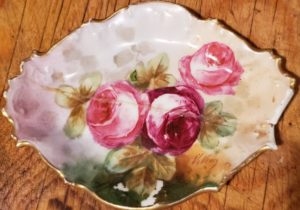
While ruminating on our theme for June, Blossoming Love, and having written a piece on the subject already (“I have always been indifferent to flowers,” June 3), I was reminded of roses, and the fact that in my first Austenesque novel, I wrote a character who was actually a Rosarian. He was a minor character, but a sweet one, Dr. Clarke, the clergyman at Pemberley who married Kitty Bennet. So I thought I’d revisit my Rosarian with some small snippets of excerpts about him and his roses.
Mrs. Darcy’s Dilemma was a very early precursor of what eventually grew into the enormous boom in Austen sequels. It was one of three Pride and Prejudice sequels written in 1993 (Presumption and Pemberley were the others), and was published by a small English press. Eventually it received national U.S. publication by Sourcebooks. The story shows the Darcys twenty-five years after the events of Pride and Prejudice, and Darcy and Elizabeth are now a happy middle-aged couple, with grown children. A visit from Lydia’s two daughters Cloe and Bettina causes romantic havoc, for Cloe and the Darcys’ charming younger son Henry fall in love, while the bolder and older Bettina embarks on a scandalous affair with the sportsman elder son, Fitzwilliam. Her career on the London stage follows, and the book ends in 1837, at the very opening of the Victorian age.
The Rev. Mr. Clarke has little part in the action; he is a peaceable gentleman who spends most of his time in his gardens, tending his roses, possibly to avoid his wife, who has developed into something of a shrew. I will give you a few clips of his scenes, reflecting the blossoms of our theme, and use flower pictures I have taken myself on trips to England as illustrations.

Here is our first glimpse of Mr. Clarke. Dinner at Pemberley has been announced, and the Darcys proceed into the dining room:
“Henry gallantly led Cloe and Jane [his sister] in the procession, following his parents, Miss Wickham and Fitzwilliam, while Dr. Clarke, who had accepted an invitation to dine at Pemberley, tardily brought up the rear with his wife. That lady did not cease complaining to him audibly until they were all seated.
‘If you did not waste so much time in the garden, William, but spent more time in the drawing-room, as you should and ought, you would benefit from the society of your betters, and not be such a rough old thing. You cut a very poor figure, that you do, by the side of real gentlemen, like Darcy; and you think nothing of shaming me before every body with your lateness. That is why we are obliged to walk last, even behind the young people.’
‘He who goes last on earth, is first in Heaven,’ he found spirit to murmur, though nobody else heard this but his wife. ‘Well! That is very fine talking, and the way you end every thing, by putting on your pulpit-hat,’ she retorted, discomfited.
When Cloe entered the grand dining room, the glittering profusion of plate on the long table, the beautiful old wooden wainscotting, and the dignified dark portraits gazing down from the walls, so struck her that she halted for a moment in the doorway, in surprise. ‘What a beautiful room! I have never seen such a one before.’ ‘It is a fine dining-room, seventeenth century, and one of the oldest in the house,’ said Mrs. Darcy, pleased. ‘This table was built specially for the room’s peculiar shape; and you see the ornaments that Mr. Darcy’s father brought back from his world tour, 1790 I believe that was.’ ‘My dear, you know as much about the house after your five and twenty years’ residence, as the old housekeeper used to do. You must not overwhelm the Miss Wickhams,’ said Mr. Darcy fondly. ‘Oh, I declare, I can never hear too much about such elegant things,’ said Miss Wickham. ‘I shall tire you by asking about them perpetually. I only hope I shall have a room like this for my own one day.’ No one answered this speech, though Fitzwilliam looked much struck by it.
They sat down to table, and Dr. Clarke, though the quietest of the party, was the first to speak. ‘My dear young ladies, it is almost a pity you are here at this season,’ he said, ‘for the gardens are nothing to see. But in spring and summer, it is a very different story. I am not ashamed of my own little garden at Lambton Parsonage – ‘ ‘I should think you are not, brother, people come from all over the country to see it,’ interposed Mrs. Darcy. He nodded gratefully at her, and continued. ‘I do have some very choice pears and peaches trained against the wall – and my borders in spring are very well worth seeing, the hollyhocks and delphiniums put on quite a show; and there are two quite beautiful lilacs, one violet, one white; but it is nothing to Pemberley. The rose gardens here! Well!’ He stopped, dreamily. ‘Dr. Clarke is a rosarian,” said Elizabeth kindly, ‘he takes especial care of our walled rose garden, and would be quite jealous, I believe, if the gardeners tried to interfere.’ ‘Oh! I hope I would not be jealous,’ said Dr. Clarke, ‘not jealous, that would be a sin. But roses are so very delicate. They require more than common care. I am devoted to Flora, you will perceive.’ ‘Yes, I do believe you care more about them than any thing,’ said his wife disagreeably, and he lapsed into his ordinary silence.”

Later, the Darcys’ daughter Jane compliments her brother on his first sermon, and compares him to their uncle.
“Nonsense, Henry, there could not have been any hard bits. You are a natural born preacher. Everyone said so. Ever so much finer than poor old Uncle Clarke, who puts one to sleep when he preaches about flowers, and the unfolding of the soul; I have heard him so often that I fall into a doze when he says the word ‘plant’. But your sermon was something else.”
At last, springtime returns to Pemberley:
“The next few weeks were very happy ones for Cloe, as they were for everyone else at Pemberley. The beauty of this particular spring seemed unprecedented, and the inmates of the house, walking in twos or threes over vast carpets of bluebells in the Pemberley woods, or past the tossing daffodils that fringed the trout-stream, seemed to find every reason to be out of doors nearly all day long.
The young couple rambled idly together, out of doors. They delighted in Cloe’s joining them on boating-parties, and in long walks with the dogs in the blossoming park, catching sight of tiny blue-and-white butterflies, and brown rabbits, and all the other manifestations of nature in its most springlike state. Within this Arcadia, little attention could possibly be given to events in the rest of the world; but there was one piece of general news which penetrated even to the lovers and their friends at Pemberley, and that was the death of the King, in the month of June. After some solemn things had been said about the death of the good old man, the topic on everyone’s lips was the new eighteen-year-old Queen, and there was a general wonder about how anybody so young, and a female, would conduct herself in such an awe-full position. They had not to wonder long, for there soon arrived a visitor who was well able to inform them on these points.”
This was the Bingleys’ rather foppish son, Jeremy, the young Darcys’ cousin, fresh from a visit to London.
“’Is everyone talking about her new Majesty?’ asked Jane. ‘Yes, I should like to hear about her,” said Cloe, with a grateful look…’Only think, she is exactly the age of Jane and me. I cannot imagine being a Queen, can you, Jane?’ ‘Oh, no! It must be quite frightening to have to discuss matters of state, and dull, too, to have to sit in council with old men and ambassadors every day. But still it is a grand thing – to be Queen of England. Did you see her yourself, Jeremy?’ ‘To be sure I did,’ he answered. ‘Once in the Park, riding, and another time at a levee – my friend, Sir Humphrey Horeland, got me into that, and it was a dreadful crush, but I saw her just the same. With difficulty, it is true, for she is so small. I had to crane my neck over the crush – like this – ‘ He demonstrated, and they laughed. ‘But is she so very small?’ cried Jane, ‘smaller than I am, or rather, smaller than Cloe, for Cloe is the littler.’ ‘Oh, yes, Cloe is quite a giantess beside her: I do not think the little Queen can be four foot eleven. Perhaps not four foot ten. And she is plump, and not pretty, with a sort of German face, a hooked little nose, and teeth that stick out.’ ‘Oh! Jeremy! How horrid, how disrespectful!’ cried the girls. ‘You are making it up,’ added Jane. ‘Indeed, I am not, but I do not mean to say she is positively ugly, for she has a very pretty skin, and smooth light hair – rather your colour, Cloe – and a most remarkable air. Every one says they have never seen anything like it. Though she is so tiny, she has the most perfect carriage, and tout ensemble; a real look of Majesty. I wish you could see her. But you will go to Court when you are married, and be presented as a married woman, will you not, Jane?’ ‘Yes, I think I shall,’ said Jane positively.

They turned, and without further conversation they walked back past a field of purple fox-gloves, and they passed into the walled garden, full of roses in bloom, and where Dr. Clarke was most happily occupied. He hailed the young people with animation. ‘How d’ye, Miss Cloe, how d’ye, Mr. Jeremy? Have you ever seen such roses as these – I should not boast, but they are approaching perfection, especially these white ones, a new strain, which I shall call Queen Victoria, to be sure. And did you notice the borders along the walk – Hayes has not done badly with them, under my direction, I think – wild-flowers, campion, lavender, celandine. I prefer a wild border to dry formalities – something more of wildness – do not you agree with me, my dear?’ ‘Oh, yes, Uncle Clarke,’ said Cloe, trying to bring her attention to what he was saying, ‘the roses – may I take a few back to poor Fitzwilliam? I think he would like it.’ ‘Well – I do not like to disappoint – by all means, you may – but if you can wait, I would advise it. Three days, Miss Cloe, only three more days, and they will be perfection: then, perhaps you will take a selection. And I have some that I am cultivating specially for his mother, too, as a great surprise. The Elizabeth rose, which – but I must betray no secrets.’ ‘That will be lovely,’ agreed Cloe, absently. ‘There is nothing like a rose, is there?’ he said, growing confidential. ‘It was a rose first taught me to love my Maker, more than forty years ago; and I always shall, until gathered in by the great Gardener.’ He bowed his head respectfully. ‘Very fine flowers, uncle,’ said Jeremy, with a nod, and they moved on. As they drew near the house, Jeremy spoke again. ‘Nice old fellow…By the by, where is my cousin Henry? I thought you would have married him by now, Cloe, that is what.'”


6 comments
Skip to comment form
The Wickham girls seem well established at Pemberley! In fact they seem to be in a fair way to capturing the Darcy boys? I do wonder whether it’s with the approval of Darcy and Elizabeth?
Kitty doesn’t appear to be happy in her marriage! I do feel rather sorry for her husband and wonder if his passion for roses came about after his marriage?
Thank you for sharing this excerpt Diana.
Author
Glynis – well it’s not telling spoilers to say that Cloe and Henry are a loving and happy couple, much approved of by Darcy and Elizabeth; but Fitzwilliam and Bettina are another cup of tea! I think Dr. Clarke was always a gentle soul who loved gardens, but Kitty had a somewhat dissatisfied nature…anyway, Mrs. Darcy’s Dilemma was my version of how it all worked out!
That was quite a fascinating excerpt. I would love to try this book and the other older titles in the world of the Austenesque. Those references to Queen Victoria admittedly excited me, because the Darcys are no longer strictly bounded by the Regency/Georgian. Most of all, the bits about the flowers and Dr Clarke were most wondrous. Thank you for sharing this.
Author
Thanks, Jen – yes there are older Austenesque books out there too! By going twenty-five years into the future, I was able to work in Queen Victoria, who ascended the throne in 1837, and also the new railroads. Such details do change the Regency atmosphere and setting a bit. Thank you so much for commenting, I’m glad you liked the excerpts!
Such a beautiful use of flowers throughout! I’m sorry for Dr. Clarke that Kitty turned out to be such a whiner. Must have been all that coughing as a young lady. 🙂 And I loved seeing Elizabeth and Darcy interact with their family. Cloe seems like she would be a delightful niece and daughter-in-law! Thanks for sharing these excerpts from one of your earlier novels, and thanks for writing it, as you have helped inspire many other writers as the genre took off. Many thanks, Diana!
Author
Oh, Christina, I can’t very well express how grateful I am for your kind and beautiful comment. I’m so glad you enjoyed the flowers and the excerpts, and the memories. It is a delight to me to see the explosion of creativity that has “blossomed” (to keep on theme here!) since the early days of Austenesque writing. You are one of the brightest stars in its exciting new firmament and I am so glad you have come to Austen Variations, where old and new fiction, experimental and classical, but always inspired by Austen, reigns and revels!